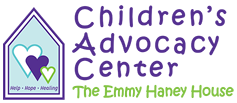
What to Expect When Coming to the CAC
The Children’s Advocacy Center: The Emmy Haney House (CAC) is a child-focused facility where families meet with professionals in the field of child abuse investigations. Services such as forensic interviews, medical exams, and therapy are offered free of charge here to reduce the trauma experienced by kids who may have been abused. The CAC is a one-stop facility that is an alternative to taking your child to various different places to meet with law enforcement, the Department of Children’s Services, medical personnel or others.
Our goal is to make sure you and your child are as comfortable and supported throughout this process.
It is often helpful for a child to be prepared by their caregiver to come to the CAC by providing some basic information. You may tell your child he or she is coming to a nice place to talk to nice people whose job is to keep kids safe. Give your child enough notice so they don’t feel surprised by the appointment, but don’t give them so long a period of time that they worry or overly anticipate their visit.

COVID- 19 Safety Procedures
The Children’s Advocacy Center of Hamilton County (CAC) is committed to providing effective, immediate and sensitive support to children affected by child abuse and child trauma, and their family members. While CAC remains committed to service delivery to children and families throughout the COVID-19 pandemic, the agency also is committed to ensuring staff, client and partner safety.
To keep staff, clients, and partners physically safe, we will practice and follow these universal prevention measures with everyone entering the CAC:
- Wash your hands frequently and thoroughly, using soap and water for at least 20 seconds throughout the day.
- Use alcohol-based hand sanitizer, if soap and water aren’t available.
- Employees, agency partners, and clients will have their temperature taken upon entrance to the center.
- Individuals with temperatures of 100.4 or above will be asked to return home and reschedule their appointments (see client screening and practices practice).
- Avoid touching eyes, nose or mouth with unwashed hands.
- Avoid close contact with people who are sick, sneezing or coughing.
- Avoid shaking hands entirely to reduce the risk of spreading infection.
- Employees must wear face masks/shields when in meetings or appointments with families or partners.
